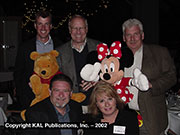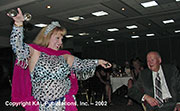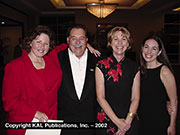
Alliance Petroleum Meeting

Herb Richards' 90th Birthday

California Independent Oil Marketers Association Spring Meeting
Want to see the photos that didn't make the issue? Check out
the Cutting Room
Floor.
Tanknology-NDE Pleads Guilty to
Falsifying UST Tests
Conoco to Lower Card
Readers For Handicapped Customers
Aurora Politicians Want To
Remove Stations from Fitzsimons District
States Consider Taxing
Fatty Foods to Fill Budget
Cain Petroleum Fined $1.43
Million by Oregon DEQ
BP to Sell Low Sulfur Gasoline in
Colorado
TANKNOLOGY-NDE PLEADS GUILTY TO FALSIFYING UST TESTS
WASHINGTON, D.C. — Tanknology-NDE International has pleaded guilty to 10 felony counts of presenting false claims and making false statements to federal agencies.
As part of the guilty plea, Tanknology has agreed to pay a $1 million criminal fine as well as $1,290,000 in restitution to the United States. In addition to the fines, Tanknology will serve a five-year term of probation and implement a quality management system to ensure that false testing practices do not occur again.
Tanknology admitted that from January 1997 to December 1999 the company's testers performed false UST tests at facilities across the country including military bases and NASA and U.S. Postal facilities.
Federal criminal investigators observed Tanknology testers on the job and found the company was taking a number of shortcuts instead of performing the required tests. These shortcuts ranged from failing to follow required test protocols to "drive-by" tests. In this latter case, a Tanknology tester was videotaped driving up to a federal facility, driving away after a few minutes, and then submitting false data as if he had actually performed the test.
Tanknology also admitted in court that its regional managers set schedules for testers that caused some to be unable to always conduct valid tests and stay on schedule.
The company also created a corporate bonus system that rewarded testers in part for the number of tests they performed, encouraging their testers to complete their work faster. This system rewarded testers who might cut corners or do incomplete tests.
At the same time, Tanknology failed to adopt any quality assurance practices that would catch invalid or incomplete tests.
"This case serves as a warning to those who knowingly place the public and the environment at risk because of their indifference to the law," said EPA Administrator Christie Whitman. "We are committed to thoroughly investigating and prosecuting violators of our nation's environmental laws."
"Tanknology was prosecuted and has been held responsible for fraudulent practices that could cause a risk of significant environmental harm," said Tom Sansonetti, Assistant Attorney General of the Justice Department's Environmental and Natural Resources Division. "The Department of Justice will vigorously prosecute such crimes to ensure that the environment is protected."
The Tanknology case was investigated by over eight federal agencies including the EPA Criminal Investigation Division, FBI, U.S. Postal Service, Defense Criminal Investigative Service, Army Criminal Investigation Division, Air Force Office of Special Investigations, Navy Criminal Investigative Service, and NASA. The felony case was prosecuted by the U.S. Department of Justice and the U.S. Environmental Protection Agency.
CONOCO TO LOWER CARD READERS FOR HANDICAPPED CUSTOMERSDENVER, CO. — In response to a lawsuit brought by a handicapped customer, Conoco has announced that it will lower card readers at its stations.
One dispenser at each of 124 Conoco stations in six states will have a lowered card reader allowing easier access for disabled consumers.
The lawsuit against Conoco was originally filed in 1999 by Conoco customers Julie Farrar-Kuhn and Carrie Lucas. Farrar-Kuhn is a paraplegic who uses a wheelchair. She charged that she was unable to reach the card readers or read the instructions at the Conoco station at Colorado Blvd., and Eighth Avenue in Denver and was unable to get assistance from a Conoco employee.
When Farrar-Kuhn tried to enter the convenience store to pay for gasoline because she was unable to use the card reader, she found the wheelchair ramp blocked by a car illegally parked in the handicapped parking spot. When that car was moved by an employee, she was still unable to get inside the c-store because an ice machine placed outside next to the door did not leave her enough room to maneuver her wheelchair. Waving at the clerk from outside the store, Farrar-Kuhn said the clerk refused at first to leave the store to assist her.
Frustrated by the experience, Farrar-Kuhn discovered that Lucas had a similar experience at a Conoco station and the pair decided to sue the oil company.
As part of an agreement brought about by the lawsuit, Conoco will also train its employees to be more sensitive to the needs of the disabled and hire an outside consultant to recommend additional changes to make at the stations to aid handicapped customers.
Conoco will be lowering card readers at its stations in Colorado, Utah, Oklahoma, Kansas, Missouri, and Texas.
Conoco Spokesman John Bennitt said that the changes "enable Conoco to improve service to people with such disabilities and we recognize them as a significant customer base."
AURORA POLITICIANS WANT TO REMOVE STATIONS FROM FITZSIMONS DISTRICTAURORA, CO. — Local politicians are looking to remove "undesirable" businesses — including service stations — from an area of town they would like to redevelop.
The Fitzsimons District has been targeted for renewal and that has meant naming 40 businesses — many of whom have been in the area for many years — as nonconforming to the city's plan. These businesses include gasoline stations as well as hotels, liquor stores, storage facilities and mobile home parks.
City planners say they are declaring businesses in the Fitzsimons District as "undesirable or nonconforming." The city said that "because of their undesirable effect on the community, nonconforming uses should be eliminated as speedily as possible."
Business owners are being asked to sell their properties to one of 13 developers who have "expressed interest in the district."
Larry Rushing, owner of the Car Care Conoco at Colfax and I-225 for the last seven years, said "They've told me that this area has been rezoned, and I'm only allowed to have a park, an office building or a public-use center on this property."
Rushing says that he had planned to renovate his building this year to make it more attractive to his consumers. He said, "I've worked my whole life for this, and now they are telling me I have to just walk away."
STATES CONSIDER TAXING FATTY FOODS TO FILL BUDGETLOS ANGELES, CA. — With the success of tobacco taxes in both changing consumers' behavior and in raising money, states are considering enacting "fax taxes" to try and steer citizens toward healthy foods while increasing their revenue at the same time.
Public health organizations have been pushing for taxes on foods that are high in fat, sugar or salt in an effort to steer citizens into more healthy eating patterns. Now that states are looking at budget shortfalls, many are taking a new look at these taxes which could be viewed in the public's best interest while serving as a fast money-maker for the government.
Taxes could be levied on a wide variety of items from snack foods such as chips and candy to restaurant desserts to whole milk and cheese or high-fat cuts of meat.
Advocates say these new taxes will work like the tobacco taxes and encourage citizens to shy away from high-fat foods because of the added expense. They claim this would help curb the obesity problem in the United States.
Opponents question not only the tax increase but the right of the government to decide which foods are good to eat and which are not.
In an attempt to stop these new taxes, the National Association of Convenience Stores has joined a coalition to try and lessen the government's control. NACS is working with the Center for Consumer Freedom which is actively lobbying against the "fat taxes."
"People should be making their own decisions about what products they choose to consume. I don't want anyone imposing their dietary beliefs on me," said Lyle Beckwith, NACS senior vice president of government relations.
"We are a coalition of restaurant and tavern operators allied together to fight the growing movement of food cops and public health zealots, people who want to tell you what to eat and drink and basically how to live your life," explained Mike Burita, communications director for the Center for Consumer Freedom.
"The growing fraternity of 'food cops,' health enforcers, militant activists, meddling bureaucrats and violent radicals who think they can decide better than you 'what's best for you' are not just attacking restaurants, they're attacking liberty," stated the Center in a call to action for the restaurant and food retailing industry.
CAIN PETROLEUM FINED $1.43 MILLION BY OREGON DEQPORTLAND, OR. — Cain Petroleum, based in Forest Grove, OR., has been fined a record $1.43 million by the Oregon Department of Environmental Quality.
The DEQ reports that it issued the penalty for "failure to complete the investigation and cleanup of petroleum releases from underground storage tanks on nine properties in the Portland area."
The DEQ had asked Cain Petroleum to investigate problems and initiate cleanup on its property including service stations in Portland, Forest Grove, Beaverton, Hillsboro and its bulk plant in Forest Grove. When the company failed to take action, the DEQ issued the record fine, claiming that Cain received "economic benefit" by not taking action to bring its sites into compliance.
Cain Petroleum is appealing the penalty.
BP TO SELL LOW SULFUR GASOLINE IN COLORADODENVER, CO. — BP has announced that they will begin marketing lower sulfur gasoline in Colorado's Front Range.
BP chose the cities of Denver, Colorado Springs, Fort Collins, and Boulder, Colorado as locations to roll out its "Clean Cities" program.Congratulating BP on its choice to include the Front Range area in the Clean Cities program, Environmental Protection Agency Regional Administrator Robbie Roberts said that the "EPA applauds the efforts of BP to get ahead of the curve by beginning to meet national levels for sulfur in fuels prior to established deadlines."
Originally published in the August 2002 issue of
O&A Marketing News.
Copyright 2002 by KAL Publications Inc.
Serving the 13 Western States, the World's Largest Gasoline, Oil, Fuel, TBA and Automotive Service Market